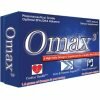Omega 3 Fish Oils & Their Effect On Our Heart Health
 In the 1980s omega-3 hit the news in a big way because of a discovery by Danish researchers involving the Greenland Inuits, or Eskimos. In the 1980s omega-3 hit the news in a big way because of a discovery by Danish researchers involving the Greenland Inuits, or Eskimos.
The Inuit diet was rich in cold-water fish and the fat of whales and seals ( All of these foods contain large amounts of omega-3 fatty acids EPA and DHA) and yet the Inuits had very low levels of heart disease despite their massive fat intake
and low levels of rheumatoid arthritis as well.
Inuits eating western diets were just as susceptible to heart disease as the rest of the population, it was the Inuit who still ate a traditional diet that seemed to be protected.
It seemed evident that genetic factors weren't the issue and Scientists concluded that it was the Inuits intake of oily fish which protected them against their massive intake of saturated fat.
FDA Landmark
There followed a number of trials including "Dart", "GISSI" and the "Lyon Study" and in 2004 the The Food and Drug Administration (FDA) announced the availability of a qualified health claim for reduced risk of coronary heart disease (CHD) on conventional foods that contain eiscosapentaenoic acid (EPA) and docosahexaenoic acid (DHA) omega-3 fatty acids. [more]
American Heart Association Guidelines on Dosages
 The AHA agree that Omega-3 fatty acids benefit the heart of healthy people, and those at high risk of — or who have — cardiovascular disease. The AHA agree that Omega-3 fatty acids benefit the heart of healthy people, and those at high risk of — or who have — cardiovascular disease.
The AHA provide advice on the minimum levels of Omega-3 to provide cardiovascular protection and these are listed in their guidelines.
Getting the Right Dose of Omega 3
Patients with documented Coronary Heart Disease are advised to take at least 1000mg of EPA/DHA per day. Sadly, most high street brands fall far short of this dosage level.
For Example:
- One 1000mg capsule of Cod Liver Oil contains about 200mg of EPA/DHA = TOO LOW by 800mg
- Two 825mg capsules of Omax3 contains 1500mg of EPA/DHA = More than meets AHA Guidelines. If the user also eats some oily fish in their diet, then one capsule may be sufficient to maintain dosage levels.
Omax3 Fish Oil - Designed by Doctors at Yale University
 Omax3™ is an ultra pure Omega-3 Supplement which has been specifically developed by physicians and scientists from the Yale University School of Medicine to provide an ultra-pure and optimally balanced Omega-3 supplement for your health. Omax3™ is an ultra pure Omega-3 Supplement which has been specifically developed by physicians and scientists from the Yale University School of Medicine to provide an ultra-pure and optimally balanced Omega-3 supplement for your health.
Omax3 delivers greater than 91% Omega-3s per soft gel, making Omax3 one of the most concentrated forms of Omega-3 available.
1 Omax3 capsule provides 750mg of Omega-3s EPA/DHA and
therefore exceeds minimum levels suggested by the AHA. Not only do you get the dosage, you get an ultra-pure product manufactured to the highest standards
Land Mark Studies showing benefits of omega 3 fatty acids in survivors of heart attacks
Dart
The Diet and Reinfarction Trial (DART) was the first randomized controlled trial to test the theory that oily fish confers protection against coronary heart disease. It showed a reduction in death rates during the 2 years after heart attacks (myocardial infarction) among men who were advised to eat about 300 g of oily fish per week, or who took fish oil supplements giving an equivalent amount of omega-3 fatty acids being equivalent to about 500 to 800 mg of omega 3 fatty acids per day. These findings have since been confirmed by the GISSI-Prevenzione trial, the Lyon Diet Heart Study, and various cohort studies.
Those patients who chose to take fish oil capsules containing 450 mg of omega 3 fatty acids (DHA and EPA) per day, had a reduction in cardiac related death of 62%, and a reduction in risk of death of 56%.
GISSI-Prevenzione trial
This study involving 11,324 myocardial infarction survivors. It showed that myocardial infarction survivors who took a capsule of fish oil every day, equivalent to 1 gram of fish oil, which is equivalent to 850mg of omega 3s, had a 30% fall in cardiac mortality, and 45% fall in risk of sudden death. And these benefits were apparent within just four months of the trial. AHA Journals (external link)
The Lyon Study
It was found that those who took the advice of eating a Mediterranean diet, with an emphasis on fruit and vegetables, and in particular an adequate intake of non marine sources of omega 3 oils (alpha-linolenic acid), had a fall in their risk of heart related death at 5 years by 70%, when compared to those patients who had no such dietary advice. The study involved 600 myocardial infarction patients.
|

